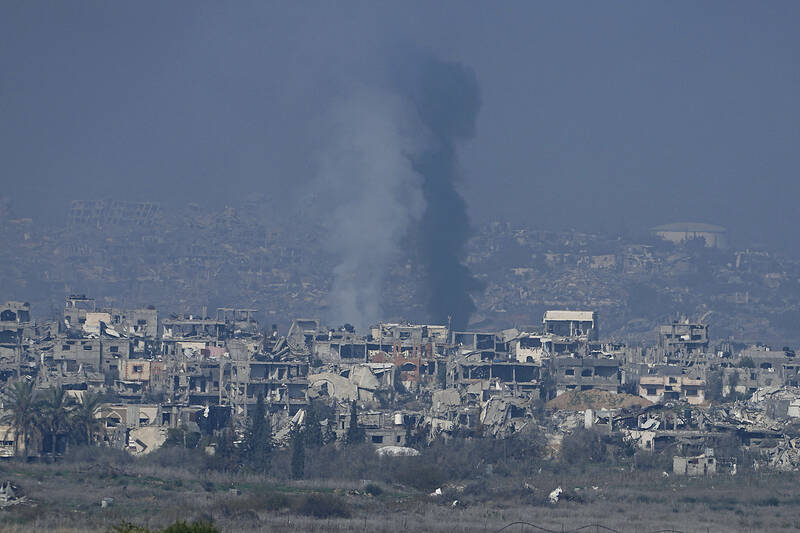Israeli Prime Minister Benjamin Netanyahu yesterday said that a “last-minute crisis” with Hamas was holding up Israeli approval of a long-awaited ceasefire that would pause the fighting in the Gaza Strip and release dozens of hostages. Meanwhile, Israeli airstrikes killed dozens of people across the war-ravaged territory.
Netanyahu began signaling there were issues with the deal just hours after US President Joe Biden and key mediator Qatar announced it was complete. The objection created a dual reality: War-weary Palestinians in Gaza, the relatives of hostages held there and world leaders all welcomed an agreement, expected to begin on Sunday, even as Netanyahu said it was not yet finalized.
It was not yet clear if Netanyahu’s statements merely reflected jockeying to keep his fractious coalition together or whether the deal was at risk.

Photo: AP
Netanyahu’s office said his Cabinet would not meet to approve the deal until Hamas backs down, accusing it of reneging on parts of the agreement in an attempt to gain further concessions, without elaborating.
Izzat al-Rishq, a senior Hamas official, said the militant group “is committed to the ceasefire agreement, which was announced by the mediators.”
The deal announced on Wednesday would see scores of hostages held in Gaza released and a pause in fighting with a view to eventually wind down a 15-month war that has destabilized the Middle East and sparked worldwide protests.
Netanyahu’s office earlier yesterday accused Hamas of backtracking on an understanding that he said would give Israel a veto over which prisoners convicted of murder would be released in exchange for hostages.
The Israeli prime minister has faced great domestic pressure to bring home the scores of hostages, but his far-right coalition partners have threatened to bring down his government if he makes too many concessions. He has enough opposition support to approve an agreement even without those partners, but doing so would weaken his coalition.
One of his far-right allies, Israeli Minister of National Security Itamar Ben Gvir, has already come out against the deal. Another, Bezalel Smotrich, said that he was demanding “absolute certainty” that Israel can resume the war later, calling the current deal “bad and dangerous” for Israel.
The departure of both of their factions would seriously destabilize the government and could lead to early elections.

SECURITY: As China is ‘reshaping’ Hong Kong’s population, Taiwan must raise the eligibility threshold for applications from Hong Kongers, Chiu Chui-cheng said When Hong Kong and Macau citizens apply for residency in Taiwan, it would be under a new category that includes a “national security observation period,” Mainland Affairs Council (MAC) Minister Chiu Chui-cheng (邱垂正) said yesterday. President William Lai (賴清德) on March 13 announced 17 strategies to counter China’s aggression toward Taiwan, including incorporating national security considerations into the review process for residency applications from Hong Kong and Macau citizens. The situation in Hong Kong is constantly changing, Chiu said to media yesterday on the sidelines of the Taipei Technology Run hosted by the Taipei Neihu Technology Park Development Association. With

CARROT AND STICK: While unrelenting in its military threats, China attracted nearly 40,000 Taiwanese to over 400 business events last year Nearly 40,000 Taiwanese last year joined industry events in China, such as conferences and trade fairs, supported by the Chinese government, a study showed yesterday, as Beijing ramps up a charm offensive toward Taipei alongside military pressure. China has long taken a carrot-and-stick approach to Taiwan, threatening it with the prospect of military action while reaching out to those it believes are amenable to Beijing’s point of view. Taiwanese security officials are wary of what they see as Beijing’s influence campaigns to sway public opinion after Taipei and Beijing gradually resumed travel links halted by the COVID-19 pandemic, but the scale of

A US Marine Corps regiment equipped with Naval Strike Missiles (NSM) is set to participate in the upcoming Balikatan 25 exercise in the Luzon Strait, marking the system’s first-ever deployment in the Philippines. US and Philippine officials have separately confirmed that the Navy Marine Expeditionary Ship Interdiction System (NMESIS) — the mobile launch platform for the Naval Strike Missile — would take part in the joint exercise. The missiles are being deployed to “a strategic first island chain chokepoint” in the waters between Taiwan proper and the Philippines, US-based Naval News reported. “The Luzon Strait and Bashi Channel represent a critical access

Pope Francis is be laid to rest on Saturday after lying in state for three days in St Peter’s Basilica, where the faithful are expected to flock to pay their respects to history’s first Latin American pontiff. The cardinals met yesterday in the Vatican’s synod hall to chart the next steps before a conclave begins to choose Francis’ successor, as condolences poured in from around the world. According to current norms, the conclave must begin between May 5 and 10. The cardinals set the funeral for Saturday at 10am in St Peter’s Square, to be celebrated by the dean of the College